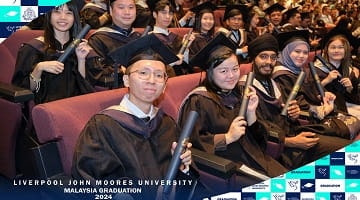About this course
Provides an in-depth knowledge of digital technologies and their application for leaders and managers working in organisations worldwide.
- Grow your digital and general managerial knowledge and bring it up-to-date
- Acquire contemporary management and digital competencies sought by profit and not-for-profit organisations seeking to fulfil their goals
- Emerging immersive VR learning business-related scenarios are embedded in the curriculum
- Study in a dynamic business school, located in the great city of Liverpool, with a strong scholarship culture with a team of reputable lecturers
- This course is also available as a 2 year MSc with Advanced Practice and includes a Business Consultancy Project 'Microeconomics of Competitiveness' module designed by Harvard Business School and delivered by Dr Moustafa Haj Youssef, an official affiliate of the MOC-Harvard network.
- Advanced Practice Study Option
Increasing globalisation, deregulation, faster innovation cycles, digital transformation and accelerating economic integration have made markets more dynamic, competitive and digital - and above all, more complex.
Digital technology is now of significant importance to organisations and on this course we consider how it can be applied. For the organisation, to become digital means not just consideration of new transformational enabling-technologies but also of human resources, business processes and strategy. On this course we cover mainstream management functions alongside digital business.
All organisations seek to improve performance. Managers are using digital advances as well as improving their use of traditional technologies to change customer relationships, internal processes and value propositions.
This one-year course has been expertly designed to place you at the forefront of contemporary business practice with a specific focus on the application of digital technologies.
Liverpool Business School at Liverpool John Moores University is a member of AACSB International The Association to Advance Collegiate Schools of Business.
AACSB International is a global association of leaders in education and business dedicated to supporting and advancing quality business education worldwide. Through membership, accreditation, research, thought leadership, professional development, and advocacy, AACSB partners with over 1,500 organizations, from more than 90 countries globally. Membership or participation in the Global Education Alliance does not imply accreditation.
Course modules
Discover the building blocks of your programme
This course is currently undergoing its scheduled programme review, which may impact the advertised modules. Programme review is a standard part of the University’s approach to quality assurance and enhancement, enabling us to ensure that our courses remain up to date and maintain their high standard and relevancy.
Once the review is completed, this course website page will be updated to reflect any approved changes to the advertised course. These approved changes will also be communicated to those who apply for the course to ensure they wish to proceed with their application.
Further guidance on modules
Modules are designated core or optional in accordance with professional body requirements, as applicable, and LJMU’s Academic Framework Regulations. Whilst you are required to study core modules, optional modules provide you with an element of choice. Their availability may vary and will be subject to meeting minimum student numbers.
Where changes to modules are necessary these will be communicated as appropriate.
Core modules
Your Learning Experience
An insight into teaching on your course
Study hours
Full-time students can expect contact hours for lectures, seminars and workshops of approximately 10-12 hours per week in each of the two taught semesters, usually scheduled over three days and between the hours of 9am and 6pm.
In the third or ‘independent study semester’ you will be guided by a supervisor. The programme is completed in 12 months.
Part-time students study a reduced workload over a two year period agreed with the Programme Leader. They study during the day in class with the full-time students.
Teaching methods
You will take part in innovative learning activities including operational and strategic business simulations and case studies developed by the team in collaboration with local companies. You will learn about topics such as pitching, business analytics, user centred design principles and social media marketing.
Applied learning
This programme employs an active blended learning approach which uses the best of both physical and digital learning provision to provide students with a dynamic and engaging learning experience.
In practice, this means that a small proportion of modules may use online delivery methods for some of the content, totalling no more than 20% of the programme overall being delivered via online methods.
During the course you will be able to apply your learning to real-life scenarios and gain important experience and expertise in effective problem solving.
How learning is monitored on your programme
To cater for the wide-ranging content of our courses and the varied learning preferences of our students, we offer a range of assessment methods on each programme.
Assessment methods on this course include: case studies, simulations, presentations, reports, data analysis and reflective learning.
Where you will study
The School is based in the Redmonds Building, in the heart of the bustling Mount Pleasant Campus and Liverpool's growing Knowledge Quarter. The building is home to high quality lecture theatres and seminar rooms, social spaces, and a café. It is only a short walk from LJMU's Aldham Robarts Library, which contains all the resources you will require for your studies, and is open seven days a week.
Liverpool Business School also has a dedicated Management Development Suite, based in a listed building in the historic Georgian Quarter of Liverpool and a short walk from the Redmonds Building. The building has recently undergone £1.2 million investment to provide a professional learning space.
Course tutors

Dr Chin Ong
Programme Leader
Life-long learning, putting management theory into practice and practice into theory are at the heart of my philosophy. I value the doing as much as the theory and enjoy all aspects of scholarly activity. As a member of the postgraduate team, I not only lead a Masters programme but also a range of modules on other Masters degrees and supervise Masters and Doctoral research.
Life-long learning, putting management theory into practice and practice into theory are at the heart of my philosophy. I value the doing as much as the theory and enjoy all aspects of scholarly activity. As a member of the postgraduate team, I not only lead a Masters programme but also a range of modules on other Masters degrees and supervise Masters and Doctoral research.
For the first 15 years of his career, Phil worked as a manager, consultant and company director in the telecomms and other industries. He worked for two management consultancies and over 20 other companies in almost as many countries. He has acted as an adviser to CEOs, the GSMA and is a risk expert with the UN. Phil became an academic (senior lecturer) having completed doctoral research at Manchester Business School. During at least 17 years of award-winning lecturing he has taught at three Universities; he holds an MA (distinction) in teaching and learning in Higher Education and is a Senior Fellow of the Higher Education Academy and a Reader at LJMU. Phil has authored ten textbooks including the bestselling Management Theory and Practice currently in its ninth edition. Research active, he supervises PhD students, is a journal editor also writes articles and delivers conference presentations. Phil is a Chartered Fellow of the Institute of Risk Management where he is also a principal examiner.
Career paths
Further your career prospects
LJMU has an excellent employability record with 96% (HESA 2018) of our postgraduates in work or further study six months after graduation. Our applied learning techniques and strong industry connections ensure our students are fully prepared for the workplace on graduation and understand how to apply their knowledge in a real world context.
On graduation you will be well positioned to undertake management roles in various countries, in areas including: business operations, digital marketing, project and consultancy work, analysis, digital media and strategy.
Tuition fees and funding
- Fee:
- £9,200
Fees
The fees quoted above cover registration, tuition, supervision, assessment and examinations as well as library membership and student IT support with access to printed, multimedia and digital resources including programme-appropriate software and on campus wifi.
Financial Support
There are many ways to fund postgraduate study for home and international students. From loans to International Scholarships and subject-specific funding, you’ll find all of the information you need on our specialist postgraduate funding pages. The University offers a range of financial support for students. You'll find all the information you need on our specialist financial support pages including details of the Student Support Fund and other activities to support with the cost of living.
Additional Costs
In addition to fees, students should also keep in mind the cost of:
- Accommodation
- Travel costs and field trips unless paid for by LJMU
- Stationery, IT equipment, professional body membership and graduation gown hire
Entry requirements
You will need:
Qualification requirements
How to apply
Securing your place at LJMU
To apply for this programme, you are required to complete an LJMU online application form. You will need to provide details of previous qualifications and a personal statement outlining why you wish to study this programme.
Your university life
From accommodation and academic support to clubs and societies. Find out what LJMU has to offer.
Related Links
Talk to our students
Connect with a current LJMU student for advice and guidance on university life, courses and more.
See what our students are saying
At LJMU we want you to know you’re making the right choice by studying with us. You can see what our students are saying about their experience with us through their reviews on the following websites:
Related Links
News and views
Browse through the latest news and stories from the university
The University reserves the right to withdraw or make alterations to a course and facilities if necessary; this may be because such changes are deemed to be beneficial to students, are minor in nature and unlikely to impact negatively upon students or become necessary due to circumstances beyond the control of the University. Where this does happen, the University operates a policy of consultation, advice and support to all enrolled students affected by the proposed change to their course or module.




























